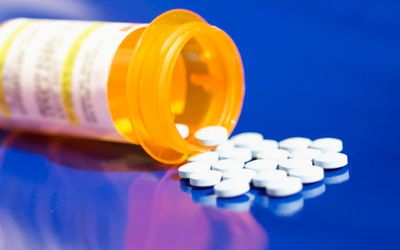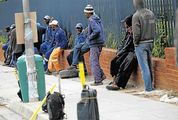THE non-profit TB Alliance on Wednesday announced the launch of a new child-friendly pill for treating tuberculosis (TB).
The development is expected to improve minors’ chances of completing their six-month drug regimen.
However, it is not clear when the product will be available to South African patients, or what it will cost.
The three-in-one pill combines rifampicin, isoniazid and pyrazinamide in appropriate doses for children and will be made by Indian drug manufacturer MacLeods Pharmaceuticals. It will cost about $15 for a six-month course of treatment for low-income countries eligible for assistance from the Global Drug Facility (GDF).
SA, as a middle-income country, does not qualify for support from the GDF, and will have to negotiate its own price with MacLeods.
Anban Pillay, head of regulation and compliance at the Department of Health, said the government would use the GDF price as a benchmark and ask MacLeods to match it for SA. Access for local children would hinge on how quickly MacLeods could get the product approved by the Medicines Control Council.
The council’s registrar Joey Gouws said no fixed-dose combination product from MacLeods was awaiting Medicines Control Council registration.
The new paediatric formulation is important because children are treated with medicines designed for adults and are consequently difficult to administer in youngsters: the pills are large and need to be halved or quartered, many taste bitter and they do not dissolve readily.
To make matters worse, adult fixed-dose combination pills contain a ratio of medicines out of kilter with World Health Organisation (WHO) recommendations for children, who metabolise drugs differently to adults. Children consequently require extra pills to make up the difference.
The new paediatric fixed-dose combination pill is the first to meet the WHO treatment guidelines for children, which were set in 2010.
About 10% of the 10-million people around the world who were sickened by TB last year were children, according to the WHO.
"The availability of correctly dosed medications will improve treatment for children everywhere," said Mel Spigelman, president and CEO of TB Alliance, ahead of the 46th Union World Conference on Lung Health.
In a separate development, Doctors Without Borders and the Stop TB partnership on Wednesday released an assessment of how well 24 of the countries hardest hit by TB are implementing policies recommended by the WHO. SA emerged as one of the good news stories in the report, as it leads the way in using rapid molecular tests to diagnose TB.
However, the report highlights that SA still requires mandatory hospital admission for patients who have MDR-TB while they are infectious, contrary to WHO guidelines, and has yet to provide one of the newest TB drugs, delamanid.

PAIN KILLER: Long-term high-dose use of common painkillers are hazardous in terms of heart attack risk. Picture: THINKSTOCK
THE non-profit TB Alliance on Wednesday announced the launch of a new child-friendly pill for treating tuberculosis (TB).
The development is expected to improve minors’ chances of completing their six-month drug regimen.
However, it is not clear when the product will be available to South African patients, or what it will cost.
The three-in-one pill combines rifampicin, isoniazid and pyrazinamide in appropriate doses for children and will be made by Indian drug manufacturer MacLeods Pharmaceuticals. It will cost about $15 for a six-month course of treatment for low-income countries eligible for assistance from the Global Drug Facility (GDF).
SA, as a middle-income country, does not qualify for support from the GDF, and will have to negotiate its own price with MacLeods.
Anban Pillay, head of regulation and compliance at the Department of Health, said the government would use the GDF price as a benchmark and ask MacLeods to match it for SA. Access for local children would hinge on how quickly MacLeods could get the product approved by the Medicines Control Council.
The council’s registrar Joey Gouws said no fixed-dose combination product from MacLeods was awaiting Medicines Control Council registration.
The new paediatric formulation is important because children are treated with medicines designed for adults and are consequently difficult to administer in youngsters: the pills are large and need to be halved or quartered, many taste bitter and they do not dissolve readily.
To make matters worse, adult fixed-dose combination pills contain a ratio of medicines out of kilter with World Health Organisation (WHO) recommendations for children, who metabolise drugs differently to adults. Children consequently require extra pills to make up the difference.
The new paediatric fixed-dose combination pill is the first to meet the WHO treatment guidelines for children, which were set in 2010.
About 10% of the 10-million people around the world who were sickened by TB last year were children, according to the WHO.
"The availability of correctly dosed medications will improve treatment for children everywhere," said Mel Spigelman, president and CEO of TB Alliance, ahead of the 46th Union World Conference on Lung Health.
In a separate development, Doctors Without Borders and the Stop TB partnership on Wednesday released an assessment of how well 24 of the countries hardest hit by TB are implementing policies recommended by the WHO. SA emerged as one of the good news stories in the report, as it leads the way in using rapid molecular tests to diagnose TB.
However, the report highlights that SA still requires mandatory hospital admission for patients who have MDR-TB while they are infectious, contrary to WHO guidelines, and has yet to provide one of the newest TB drugs, delamanid.























Change: -2.86%
Change: -2.94%
Change: -4.28%
Change: -2.14%
Change: -4.39%
Data supplied by Profile Data
Change: -2.96%
Change: -1.47%
Change: -2.86%
Change: 0.00%
Change: -1.31%
Data supplied by Profile Data
Change: 1.23%
Change: 0.88%
Change: 2.06%
Change: 2.10%
Change: 0.56%
Data supplied by Profile Data
Change: 0.20%
Change: -1.15%
Change: -0.14%
Change: -2.44%
Change: -2.13%
Data supplied by Profile Data